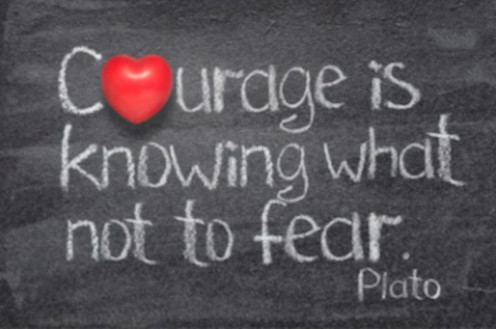Making Changes in Your Life Could Reduce Stress

Stress is not only unpleasant, it is a silent killer. While it begins in the brain, its effects travel throughout the body, causing damage. In addition to interfering with the ability to relax or sleep, stress can cause irritability, headaches, and even memory loss. It also inhibits the body's ability to produce "feel good" hormones, and therefore can trigger depression.
When you're experiencing an extraordinary amount of stress in your life, it could be that a major change is what's needed. Although any major life change can make you feel anxious, sometimes not making a change can be even more stressful, in the long run, than change.

Change Challenges the Comfort of Routine
Let’s face it. We all get comfortable with things just the way they are. Routine might be boring, but at least it’s predictable—and there’s a certain amount of peace that abides with predictability. Sure, we might whine about how boring routine is, but deep down inside it’s somewhat comforting to know what’s ahead hour by hour as the day goes by. And sometimes, even when presented with an opportunity to make a desired, albeit major, life change to a boring routine, many opt to stick with the tried and true.
Here’s a case in point. Once, at a company where I'd worked for about two years, one of my coworkers, a work friend who often complained about having been with the company for six years without a promotion, was offered an opportunity to be promoted. Even though he handled the job he held expertly, he was completely stressed out by it and was tired of doing it. Not only was he tired of doing what seemed like hundreds of tasks daily, dealing with hundreds of employees and their office supply needs, he was not really a "people person," but had to force himself to be one because the position demanded it.
The promotion would have taken him to a position that was one level above where he was at the time. He seemed happy to know he was being considered for the position, but a few days later, after telling me and a few other coworkers about the anxiety he was experiencing while trying to make a decision, he chose to remain in the position he had.

My coworker said he was comfortable in the job he had, arguing that he wasn’t at all sure he was "ready" for the responsibilities the promotion would bring. The job he had was very demanding indeed. The new job, however, had a higher level of management responsibility and wasn’t nearly as task-oriented. In time it would have been much less stressful than the job he had. It would have released him from much of the tedium and minutia of his daily grind, and he would not have had to deal with so many people on a daily basis. In addition to a new set of responsibilities, and a higher salary, he would have had to learn some management and leadership skills. So, even though it had a "learning curve," in time the new position would have been much less stressful, overall. But my coworker turned down the opportunity down to be considered for position. Allowing his anxiety to get the best of him, he chose to pass on the possibility of promotion, and, from that day forward, he had to stop whining about never having been promoted at the company.
While I must say that I understood his anxiety, I’m not sure I would have made the same decision he made. Sure, he wasn’t certain things would work out in the new position, and he was already an "ace" at the job he held. Sure, he didn’t know if the new job would be one he’d like better than the one he had, which he often said he hated. Still, even though the job he had was demanding and tedious, he was good at it and knew exactly what to expect from it. He would have had to leave behind that familiarity and comfort in order to take advantage of the promotion, and he was not willing to do that. So, he made up his mind to stick with the known entity and the "comfort" represented by the stressful familiarity of the job he knew, and did not love.

He thought he was ready for a change, but when a job change was offered to him on a silver platter, he allowed anxiety and stress to get the best of him, and he turned it down. But isn’t anxiety and its accompanying stress simply part of the dizziness of growth? Just because something makes you feel anxious does not mean it is always a prelude to something bad. More often than not, I believe change can be a prelude to something greater, or at least something different and, therefore, can represent a good challenge and an opportunity for growth.
The High Cost of Stress
In a 2018 article discussing how stress affects people in different socioeconomic groups in this country, author Gillian Mohney, on the website healthline.com (in an article titled, "Stress Costs U.S. $300 Billion Every Year"), said the yearly cost of stress in the United States is now $300 billion dollars. Pointing to the fact that discrimination and poverty are shortening life spans in the U.S., the article reported that "men who make in the top 1 percent of income live almost 15 years longer than those in the bottom 1 percent."
This article, pointing to a report published by the American Psychological Association, also said that in addition to affecting a person's mental health, stress also takes a harsh toll on the body, physically. Among other things, it causes the release of inflammatory hormones that increase cardiovascular and cancer risk, while also causing other health-related problems. These things, the authors said, end up leading, every year, to “accidents, absenteeism, employee turnover, diminished productivity, and direct medical, legal, and insurance costs.”

Overcome the Fear and Stress of Change
When you resolve to do something, it means you become firm in your determination. You are resolute. You make a decision and then you set a course of action. You tell yourself that no matter what, you will stick with your decision, and you'll remain determined to do what you set out to do. Then, as you begin taking the necessary steps to achieve your goal, you are resolving to face, head on, any fear you encounter along the way.
Using the example of my coworker, what if he had decided to accept the promotion he was offered, instead of turning it down as he did? What are some of the things he could have done to alleviate some of the fear and stress he was encountering in regard to the new position, one he was sure to be offered?
- He could have tried to determine what he was afraid of. When you find yourself becoming anxious about any big decision, shouldn’t you ask yourself exactly what it is that you are afraid of? Anxiety and its accompanying stress is usually borne out of fear, and if you’re afraid, it's a good idea to pinpoint, if you can, exactly what it is that is frightening you.
- After finding out what he was afraid of, my coworker could have done his best to calm his fears. He could have talked to friends and coworkers, getting concerns he had about the new position off of his mind. If he didn't want to discuss it with coworkers, perhaps he could have talked to a family member or someone else he trusted. It helps to reduce stress to share your thoughts and feelings with those you trust. Sharing his concerns would have been an important first step to help my coworker begin managing the stress of a major change in his career.
- He could have stopped listening to the negative self-talk that was most likely going on in his mind. After telling friends at work how much he wanted to be promoted, then turning down a good opportunity to actually be promoted, there had to be a lot of negative self-talk going on in my coworker's mind. Most likely, he was imagining the downside of getting a new job, and wasn't able to see himself being successful in the position. When facing a major life change, it can be calming to think positively, and to visualize a positive outcome.
- Instead of cowering in a corner, like a scared little child, after he discovered what he was afraid of, my coworker could have started preparing himself in any way possible to accept the new position that was sure to be offered since his supervisor asked him to apply for it. He could have taken the time to look at and compare his skills, abilities, and interests to every aspect of the new job, so that he could begin thinking about what he could do to prepare and get ready for new responsibilities.

Get Busy Learning
A good way to get over the fear and sweats caused by anxiety is to begin the process of learning what you will need to know in order to face the consequences of a major, life-changing decision. There may be no way to know for sure exactly what will happen next, but in the case of my coworker, learning all he could about the responsibilities and expectations related to the position, had he accepted it, would have been a helpful thing to do. Taking time to research and learn these things would not only have been a good use of his time, it would have taken away much of the time he spent worrying and being afraid of change.
No matter what type of change you might be facing, it can only help to do all you can to learn more about any challenge that might be ahead. Working to prepare, as best you can, for anything you might face in the future is always a positive and empowering response to the stress of change.
I think my coworker would have found—had he accepted the position—that fears subside when you face them, head on. Things tend to get easier. My coworker’s boss was offering him the promotion, and that meant his supervisor already believed he was ready for it. The supervisor knew the responsibilities of the job and had worked closely with the person who had held it previously. He would not have offered it to my friend had he not believed he could handle the responsibilities. He was trying to give my co-worker a chance to be promoted.
As a strong believer in the notion that you can do anything you set your mind to, I believe fear was the only thing standing between my coworker and becoming a success in the position he was offered. I think all he needed, in the final analysis, was a way to calm his anxiety.

You Don't Have to Be Perfect at All Times
Most people are afraid, at least somewhat, when changing jobs or when facing any major life change. In my example, my coworker was used to being not just good, but great at his job. Even though he was tired of the tedium it entailed, he enjoyed being seen as the best at what he did. Starting a new job was going to require a learning curve. Most likely, his boss realized this when he offered him the position.
My coworker, like anyone else, would have needed time to learn the ins and outs of the new position before mastering the new responsibilities. He needed to allow himself time to learn the new job, the patience to make mistakes, and the due diligence to ask questions. I believe if he had given himself the permission to need and to have a learning curve, that once he was a little more familiar with the new role, his anxiety would have dissipated quickly. If he had chosen to focus on the excitement of having a new position, which came with a higher salary and management responsibilities—instead of allowing his fears to overwhelm him, I believe he would soon have been able to excel in his new job.

Imagine Not Being Afraid or Anxious; Visualize Yourself Having All the Courage You Need
When you find yourself feeling anxious about a major change occurring in your life, chances are you’re imagining all that could go wrong as a result of the change. Why not imagine, instead, what it would look and feel like to not be afraid of the changes? Have other people gone through what you’re fearing and survived? If so, then there’s plenty of room for hope that you’ll be fine as well.
Using the example of my coworker, when it comes to the fear associated with changing jobs or being promoted at your current company, it might be good to remember that thousands of people either change jobs or get promoted every day. Thousands of people learn the responsibilities of new jobs and new workplaces, every day. Instead of imagining yourself unable to handle the stress of learning a new job or a new company, imagine the opposite.
In his best-selling book, The Seven Habits of Highly Effective People, author Steven Covey talks about how it can help when approaching anything new or challenging, to “begin with the end in mind.” That means you should see yourself doing what you need to do to become successful, and you should see yourself achieving the success you want. Expect positive results while working to achieve success, and it is more likely to come to you.
And most important of all, take care of you. Surround yourself with positive, encouraging people, remind yourself of your strengths, and prepare as much as you can to face the challenges of any major changes in your life. Chances are you are already smart enough, strong enough, and skilled enough to meet the demands and challenges of change, and now you just need to believe that you are.
© 2012 Sallie B Middlebrook PhD








